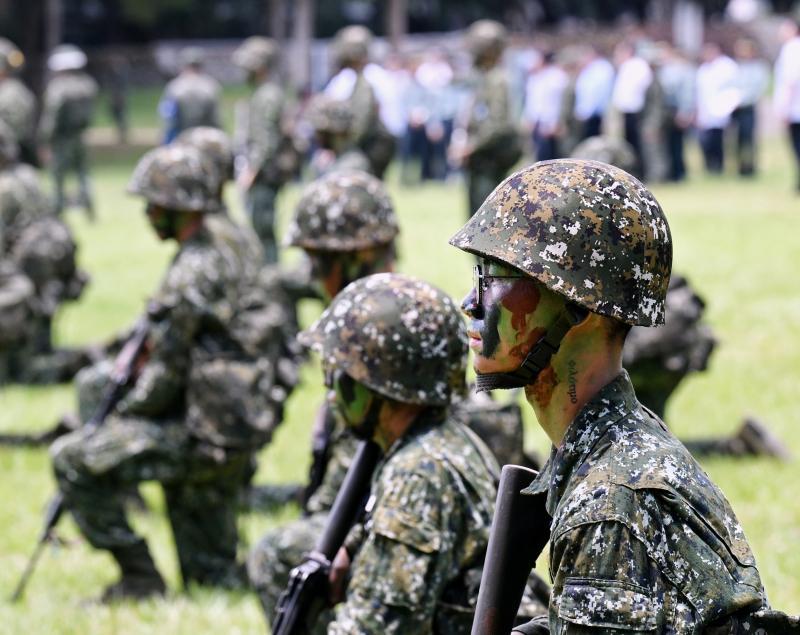The Ministry of National Defense (MND) today delivered its Quadrennial Defense Review (QDR) to lawmakers, highlighting the nation’s defense strategy and elaborating on the role of US military cooperation.
As per Article 31 of the National Defense Act (國防法), the ministry must publicly submit the QDR to the Legislative Yuan within 10 months of a presidential inauguration.
The Legislative Yuan’s Foreign and National Defense Committee invited Minister of National Defense Wellington Koo (顧立雄) to deliver the review and answer questions from lawmakers.

Photo: Fang Pin-chao, Taipei Times
The previous QDR in 2021 focused on strong defenses and multi-layered deterrence, which remained unchanged in this iteration.
The strategy would take advantage of Taiwan’s terrain to develop military preparation around the principles of “adaptability, agility, lethality, cost-effectiveness and stealth,” the latest QDR said.
The nation would build combat capability across land, sea and air, in addition to cyber, to deter aggression, the QDR said.
In wartime, the ministry would rapidly mobilize, enact multiple layers of defense and lean on military-civilian integration to delay enemy actions, weaken any invading forces and force a retreat, it said.
Future budget increases would focus on enhancing asymmetric capabilities and strengthening counters to “gray zone” threats, the QDR said.
To bring the total defense budget to President William Lai’s (賴清德) target of more than 3 percent of GDP, the MND would prioritize a special defense budget, it added.
Unlike the previous QDR in 2021, the latest review included a separate chapter dedicated to “linking regionally to strengthen collective deterrence,” with the chapter’s first section dedicated to “deepening military exchanges between Taiwan and the US.”
The US is an important strategic partner, engages in close military exchanges and assists the nation in developing its self-defense capabilities, it said.
The ministry would continue to promote strategic cooperation with the US to maintain peace and stability in the Taiwan Strait, it added.
As for future cooperation plans, the ministry would expand and deepen cooperation in strategic national security dialogues and visits, joint military exercises, defense industry cooperation and intelligence sharing, it said.

Chinese spouse and influencer Guan Guan’s (關關) residency permit has been revoked for repeatedly posting pro-China videos that threaten national security, the National Immigration Agency confirmed today. Guan Guan has said many controversial statements in her videos posted to Douyin (抖音), including “the red flag will soon be painted all over Taiwan” and “Taiwan is an inseparable part of China,” and expressing hope for expedited reunification. The agency last year received multiple reports alleging that Guan Guan had advocated for armed reunification. After verifying the reports, the agency last month issued a notice requiring her to appear and explain her actions. Guan

The Kaohsiung Tourism Bureau audited six hotels in an effort to prevent price gouging ahead of Korean band BTS’ concert tour in the city scheduled for Nov. 19, 21 and 22 this year. The bureau on Friday said that the audits — conducted in response to allegations of unfair pricing posted on social media — found no wrongdoing. These establishments included the local branches of Chateau de Chine, Hotel Nikko, My Humble House, and Grand Hai Lai, it said, adding that the Consumer Protection Commission would have penalized price gougers had the accusations been substantiated. The bureau said the Tourism Development Act

BACK TO WINTER: A strong continental cold air mass would move south on Tuesday next week, bringing colder temperatures to northern and central Taiwan A tropical depression east of the Philippines could soon be upgraded to be the first tropical storm of this year, the Central Weather Administration (CWA) said yesterday, adding that the next cold air mass is forecast to arrive on Monday next week. CWA forecaster Cheng Jie-ren (鄭傑仁) said the first tropical depression of this year is over waters east of the Philippines, about 1,867km southeast of Oluanpi (鵝鑾鼻), and could strengthen into Tropical Storm Nokaen by early today. The system is moving slowly from northwest to north, and is expected to remain east of the Philippines with little chance of affecting Taiwan,

The military yesterday said it has located the flight data recorder, or black box, of an F-16V jet that disappeared off eastern Taiwan earlier this month, and it would soon deploy a salvage team to try to retrieve it. Air Force Command Headquarters said that while it had pinned down the location of the black box, it was still searching for the aircraft’s sole pilot, air force Captain Hsin Po-yi (辛柏毅). Without providing details, the air force said it had located the black box days after detecting some intermittent signals and would now engage a team of professionals to retrieve it. The air